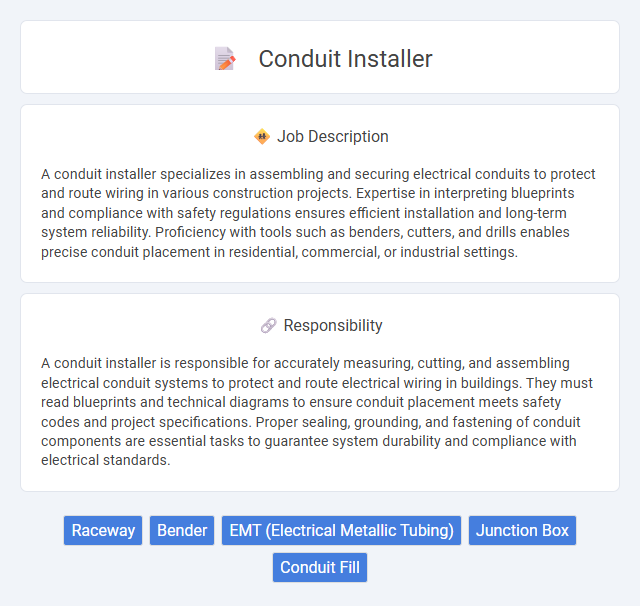
A conduit installer specializes in assembling and securing electrical conduits to protect and route wiring in various construction projects. Expertise in interpreting blueprints and compliance with safety regulations ensures efficient installation and long-term system reliability. Proficiency with tools such as benders, cutters, and drills enables precise conduit placement in residential, commercial, or industrial settings.
Individuals with strong manual dexterity and comfort working in physically demanding environments are likely suitable for a conduit installer job. Those who can handle confined spaces, heights, and varying weather conditions might find this role fitting their skills and tolerance levels. People who struggle with repetitive tasks or have limited physical endurance may find the job challenging and less appropriate for their abilities.
Qualification
A conduit installer must have a high school diploma or equivalent and complete an apprenticeship program combining on-the-job training with technical instruction. Proficiency in reading blueprints, knowledge of electrical codes, and physical ability to handle heavy materials are essential qualifications. Relevant certifications such as OSHA safety training and NCCER accreditation enhance job prospects and demonstrate competency.
Responsibility
A conduit installer is responsible for accurately measuring, cutting, and assembling electrical conduit systems to protect and route electrical wiring in buildings. They must read blueprints and technical diagrams to ensure conduit placement meets safety codes and project specifications. Proper sealing, grounding, and fastening of conduit components are essential tasks to guarantee system durability and compliance with electrical standards.
Benefit
Working as a conduit installer likely offers competitive pay and opportunities for overtime, contributing to financial stability. Benefits may include access to health insurance, retirement plans, and paid time off, increasing overall job satisfaction. The role probably provides practical skill development and potential for career advancement within the electrical or construction industries.
Challenge
The conduit installer job likely involves physical and technical challenges, requiring precision in measuring, cutting, and securing conduit systems in various environments. Workers probably face tight deadlines and complex building codes that demand problem-solving skills and adaptability. The role could present risks related to working in confined spaces or at heights, emphasizing the importance of safety awareness and proper training.
Career Advancement
Conduit installer jobs offer pathways to career advancement through skill development in electrical systems, blueprint reading, and safety compliance. Experienced installers can progress to supervisory roles, project management, or specialize in complex conduit installations for industrial or commercial projects. Certification and continued education enhance opportunities for higher wages and leadership positions within the electrical construction industry.
Key Terms
Raceway
A Conduit installer specializes in installing raceways, which are protective channels for electrical wiring systems in commercial and industrial environments. Precision in measuring, cutting, and securely fastening raceways such as EMT, PVC, or rigid conduit ensures compliance with electrical codes and prevents damage to wires. Expertise in interpreting blueprints and coordinating with electricians is essential for efficient conduit layout and raceway installation.
Bender
Benders specializing in conduit installation expertly shape and bend metal conduit pipes to precise angles for electrical wiring systems, ensuring secure and compliant pathways. Their work requires proficiency in interpreting blueprints and applying mechanical tools like hydraulic and manual benders to customize conduit fits. Skilled conduit benders play a crucial role in maintaining the structural integrity and safety of electrical installations in residential, commercial, and industrial projects.
EMT (Electrical Metallic Tubing)
Conduit installers specializing in Electrical Metallic Tubing (EMT) expertly measure, cut, and bend EMT to create secure electrical pathways in residential, commercial, and industrial settings. They ensure all EMT conduit runs are accurately installed to protect electrical wiring, complying with National Electrical Code (NEC) standards and local building regulations. Skilled in assembling connectors and fittings, EMT conduit installers enhance system durability and safety, minimizing potential electrical hazards.
Junction Box
A conduit installer specializes in routing electrical conduits and connecting them securely within junction boxes to ensure safe and efficient wire distribution. Accurate measurements and precise alignment of junction boxes are critical to maintaining electrical code compliance and preventing future system failures. Mastery in sealing and securing conduit entries into junction boxes improves system durability and reduces the risk of electrical hazards.
Conduit Fill
Conduit installers specialize in assembling and securing conduit systems to protect electrical wiring, ensuring compliance with National Electrical Code (NEC) conduit fill requirements that limit the number of conductors inside a conduit to prevent overheating and maintain safety. Proper conduit fill calculations are critical to avoid exceeding the maximum allowable fill percentage, which varies by conduit type and size, optimizing electrical system performance and reducing risks of insulation damage. Skilled conduit installers use accurate measurement tools and techniques to achieve correct conduit fill, facilitating efficient electrical installations in commercial, residential, and industrial projects.
 kuljobs.com
kuljobs.com